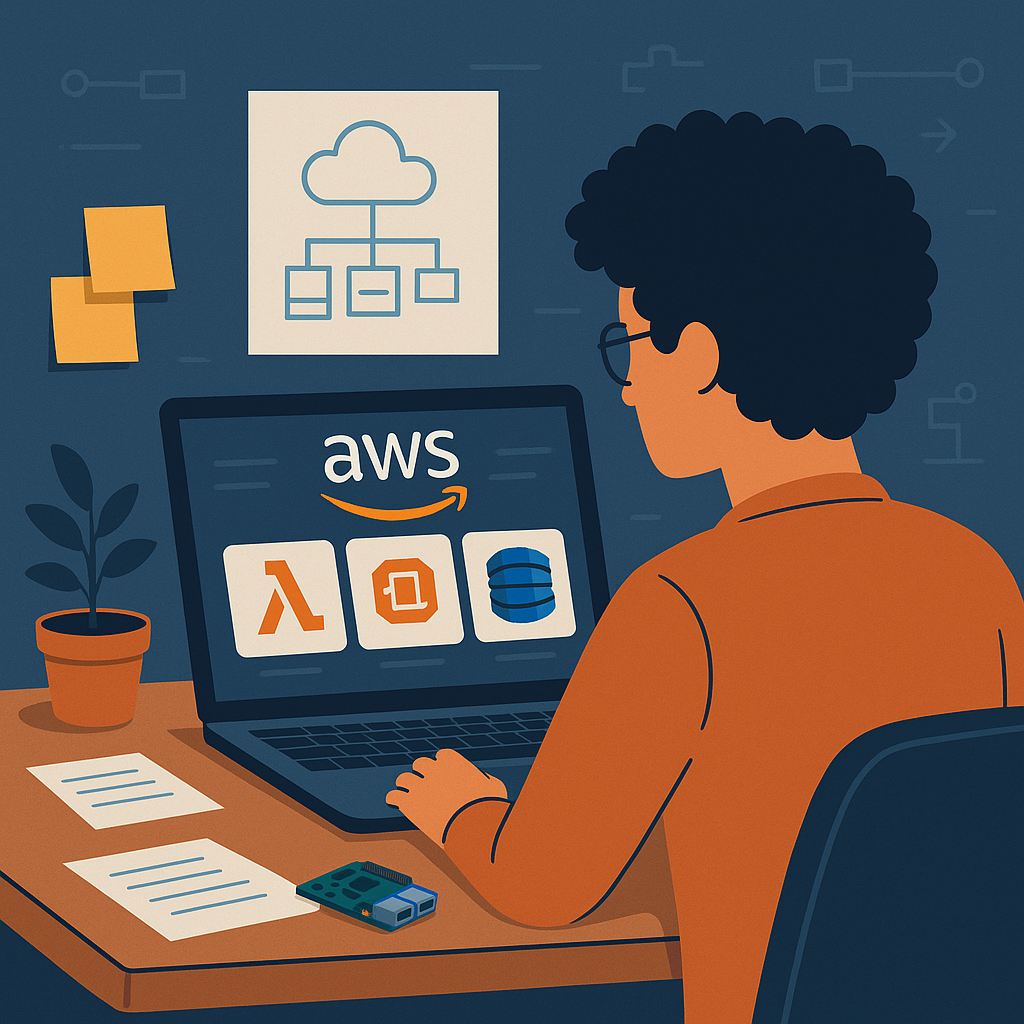A Day in the Life of an AWS Consultant at superluminar
June 27, 2025
AWS can be a jungle — and being an AWS consultant means navigating it daily. Here’s a peek into what it’s really like to juggle client demands, crack technical puzzles, and carve out time for experiments and oddball projects. Spoiler: it’s never boring!
Disclaimer This article was written in collaboration with an AI writing assistant. I answered a series of questions about my day-to-day work and experiences, and the assistant helped me turn those answers into a cohesive, engaging narrative.
Morning Kickoff and Balancing Clients
My mornings start with coffee — no surprise there. Once caffeinated, I read emails, check my agenda, and spend the first 30 minutes sorting internal work at superluminar and prepping for the day. After that, it depends entirely on which project I’m focusing on. It might be reviewing dashboards and reports, jumping straight into programming work, or joining a pre-sales workshop or client meeting.
As a consultant, working with multiple clients sometimes means constantly switching mental contexts. Unlike an in-house role, where you typically live and breathe one product, consulting can have you juggling two client projects that each demand full attention — and that can be overwhelming. On the flip side, the variety can be energizing, especially when projects differ in energy and complexity. To stay on top of this, I block out specific time for each client and communicate that upfront. Sure, it’s not always a crowd-pleaser (“wait, you’re booked for someone else today?”), but setting expectations helps.
Deep Dive: Real-World AWS Tasks
One of the more memorable technical puzzles I tackled recently involved private hosted zones in AWS. I’d set up a private hosted zone and attached it to a VPC — all good, except I didn’t realize that the hosted zone already existed globally. The application using these private hosted zones was deployed to different stages, each with slightly different TLDs. One of these was conflicting with the globally existing zone, which led to an inconsistency in the DNS resolution, sometimes trying to resolve internally and sometimes externally.
What I love about these kinds of tasks is how they combine puzzle-solving with big-picture thinking. Some issues are straightforward, like a simple programming exception. Others — like the DNS puzzle — can spiral into a deeper dive involving multiple AWS services, global DNS behavior, and even some obscure options for Linux command line tools. It’s a blend of debugging code-level issues, unraveling architectural or data modeling challenges, and developing new software according to the client’s needs. Whether it’s figuring out why a function call throws an exception or why 100k reads on a database bring the whole system to a crawl, I enjoy getting to the actual root cause and seeing how the different layers of a system interact.
Meetings and Client Interactions
How I approach client conversations really depends on the client’s experience and the audience. When I’m talking to AWS-savvy clients, I’m happy to dive straight into the technical weeds. For clients with less experience, I try to adapt to their context and speak their language. That part can be surprisingly challenging: clients often have their own deep domain knowledge that I don’t have upfront. So, the real question isn’t just what jargon I’m using, but how to find the common ground that lets us actually solve problems and spot opportunities together.
Playful Experiments and Curiosity Breaks
For me, the ultimate “just for fun” AWS experiment has to be running ECS Anywhere on a Raspberry Pi. It’s so far removed from most actual client system when you talk about Pi hardware, but the idea itself has a serious background: ECS Anywhere can be incredibly useful in migration projects and hybrid cloud scenarios. And even Raspberry Pis are used in one of our client projects.
These playful experiments definitely feed back into my consulting work. They keep me motivated and often spark ideas that eventually find their way into client projects. At superluminar, we typically have Fridays reserved for these kinds of internal projects and experiments — whether it’s testing out quirky ideas like ECS on Raspberry Pi or writing blog posts like this one. From Monday to Thursday, it’s all about client work, so these Fridays give me a chance to recharge and explore new concepts that might not fit into the usual billable hours.
Security, Cost, and the Big Picture
Security and cost are always part of the mindset I bring to any client project. At superluminar, we start by asking the client about their security and compliance needs and then automate those as much as possible. Tools like AWS Config, Security Hub, and GuardDuty help keep things consistent and transparent — and reduce surprises down the line.
Cost awareness goes hand in hand with this. We’re always looking for ways to balance performance with cost and help clients avoid expensive surprises. Whether it’s right-sizing EC2 instances or choosing more cost-effective serverless services, keeping an eye on cost is part of the job.
As for certifications like Data Analytics, Security Specialty, and so on — they’re a bit of a two-sided coin. While AWS does try to ensure that only truly capable people pass these exams (and I hope I’m one of them), it’s still possible to just learn for the test without real-world experience. But certifications do have a concrete role for us: as an AWS Advanced Partner with multiple service deliveries and competencies, superluminar needs to have enough certified employees to meet those partnership requirements. Some larger clients also see certifications as a basic check of whether a consultancy has the skills to handle the project — though smaller clients often care more about real-world results than about certificates on paper.
Wrap-Up: The Fun and the Frustration
Besides my awesome colleagues (who definitely deserve a shoutout), the most satisfying part of this job is when things just work. Closing the laptop in the evening, knowing I solved something really hard, is an incredibly satisfying feeling.
On the flip side, it’s frustrating when you keep digging deeper and deeper and still can’t solve an issue — or when someone promises the world and reality doesn’t quite live up to the marketing.
If I had to give one piece of advice to someone thinking about AWS consulting, it would be this: be willing to learn every single day.

